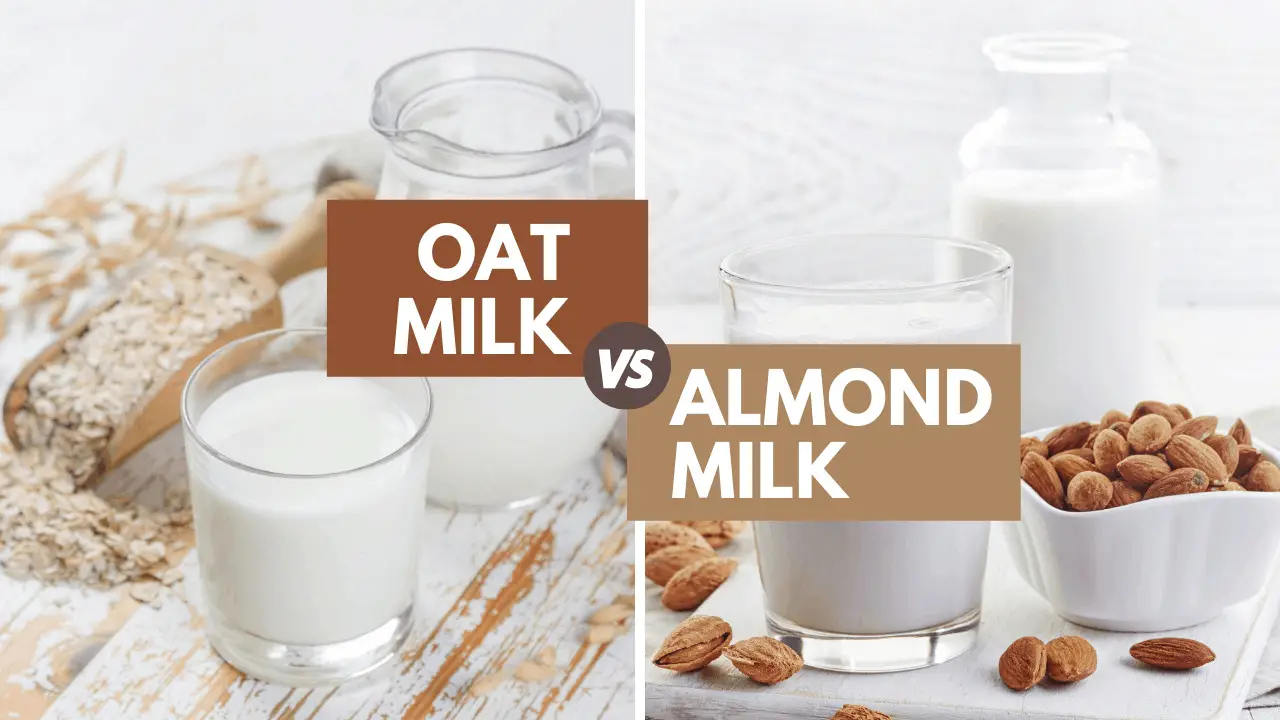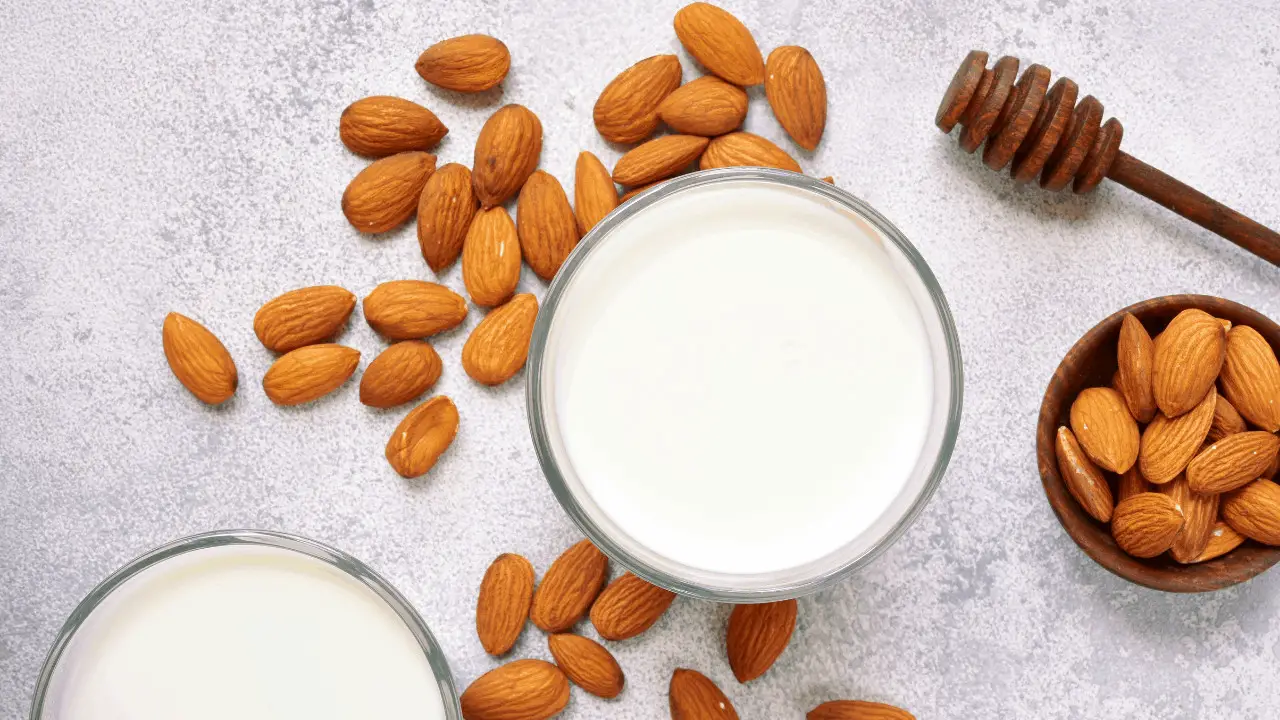There are so many milk alternatives available in the market today. The two most popular are almond and oat milk.
But, when it comes to choosing a plant-based milk alternative it comes down to 2 factors:
(a) Do you have a medical condition in which you can’t consume a particular milk?
(b) Which milk tastes better to you?
With the growing demand, the dairy alternatives market is booming, but with this, we find ourselves in the newest debate: which milk, almond, or oat is the better one in terms of health? Are they both equally good? What are the things that consumers should keep in mind before choosing a dairy alternative?
The Tied Categories.
Below are the categories that are a wash when almond and oat milk are in direct competition:
‘Milking’ Process
Both oat milk and almond milk are plant-based, derived by grinding oats and almonds respectively with water and then straining the mixture produced. The liquid obtained this way is what we call “milk”. In essence, they are both mainly water, with only a small amount of nutrients coming from the nuts or grain.
Nutrition
Although oats are a good source of fibers, oat milk will contain a lesser amount of fibers as the fiber part is removed when sieving the solids out. Similarly, consuming almond whole will yield you more healthy fats than its milk counterpart.
Since both of them lack essential nutrients, each store-bought brand fortifies the drink with essential vitamins and minerals like vitamin A, vitamin B2, vitamin B12, vitamin D, phosphates, calcium, magnesium, etc. By doing this, the consumer gets some essential nutrients they will otherwise have been lacking if they drank the milk.
Plant milk, be it almond, oat, soy, or hemp milk, are nutritionally inferior to dairy milk.
More or less, a commercially produced almond and oat milk will contain some amount of essential nutrients, making them nutritionally more or less similar in terms of vitamins and minerals. But neither of them is going to yield you a lot of healthy nutrients, and you will have to compensate for this lack of nutrition from other food sources to avoid major health issues
Heart Healthy
The healthy fats- polyunsaturated fatty acids (PUFA) in almond milk- helps prevent heart diseases by lowering triglyceride levels, LDL, and total cholesterol levels. But oat milk has also been shown to lower cholesterol levels, and so it is a good alternative for people with hypercholesterolemia too.
Lactose Free
As both are plant-based milk and lactose-free they are beneficial for people with lactose intolerance, cow milk allergy, IBD, and IBS.
Vegan Friendly
Additionally, for folks that choose to not drink animal-based products for ethical reasons, these kinds of milk provide a suitable alternative.
The Qualifying Categories.
Taste and Texture Comparison
Oat milk is more close to cow’s milk in texture and taste. It is thicker than almond milk. So, if you like your milk to be thick and more “milk-like”, then you will most likely enjoy it more than almond milk.
Almond milk is more water-like and has a nutty taste. If you don’t enjoy very thick consistency milk; this will probably be the milk for you.
Final Commentary: Oat milk wins this round with a slim margin
Diabetes Friendly
Almond milk is high in protein content, with no natural sugar content in it. This can be beneficial for diabetes. Unlike carbohydrates, proteins don’t cause a post-prandial sudden rise in blood glucose levels. Regular consumption of nut and nut-based products may help reducing fasting blood glucose as well.
Final Commentary: Almond Milk wins this round!
Gut Healthy
Almond milk has a lower fiber content than oat milk but has many essential and non-essential amino acids. For example, it can be a good source of Vitamin E and PUFA. Vitamin E is an antioxidant and helps reducing inflammation in our body. In comparison, Oat milk contains soluble fibers. These fibers may help promote gut health. It is also tested and recommended for people with IBD and IBS.
Final Commentary: We have to give this round to oat milk
Weight Loss Friendly
Oat milk contains beta-glucan, a soluble fiber that reduces blood sugar levels by delaying gastric emptying. This just means that it increases the gastric transit time and keeps you full for a longer time. That said almond milk has negligible sugars which do not spike blood sugar. As we are beginning to understand an often overlooked aspect of weight loss is hormones. Having the body constantly flood the system with insulin to deal with the spikes in blood sugar can lead to insulin resistance in the long term. Insulin resistance makes weight loss almost impossible when the body is in this state, it is predisposed to converting excess calories to fat and not accessing the fat stores.
Final Commentary: We got to give this round to almond milk
Oat Milk Vs Almond Milk: When to Avoid?
Almond milk must be avoided by anyone who has a nut allergy. Intake of almond milk in these cases will trigger anaphylaxis, which can be life-threatening. If you have a nut allergy, choose oat milk.
Also, almond milk is not a good option for tea and latte lovers because almond milk tends to separate when added to hot beverages.
Oat milk, on the other hand, would be better if you want a milk replacement for your tea or coffee.
Although rare some people may be allergic to oats as well. If this is the case avoid oat milk. It also contains phytates, and therefore it may hinder the absorption of certain minerals like calcium, iron, magnesium, and zinc. To avoid this, avoid oat milk consumption with your meals.
Oat milk may worsen the symptoms of celiac disease, if the oats used in the products are contaminated with gluten-containing substances, like wheat. This contamination can occur because oats and gluten-containing whole foods are produced in the same places quite frequently.
Apart from this, both almond milk and oat milk are not good weaning foods for infants. In the cases where protein-energy malnutrition was reported in infants, it was found to have been associated with plant-based milk.
Additionally both almond and oat milk do not make a good supplement for the elderly, as these milk are poor in vitamin d and calcium content. As we age, our bone mineral density starts reducing, and so efforts must be made to ensure that our bones are healthy.
Winner
When comparing almond milk to oat milk, we give a slight edge to almond milk but this is ever so slight. That said, both are not that nutritious when compared to cow milk. Most companies fortify these so they are nutritionally quite similar with very few differences in nutrition value.
However, almond milk is a better option if you have chronic kidney disease. Patients with kidney disease should have a diet low in phosphorus and potassium. Additionally, it proves to be a better ‘milk’ for pre-diabetic or diabetic people.
That said, make it a habit to check the label of the product before buying, and make sure to compensate for the lack of nutrition from other sources, even if your milk is fortified.







